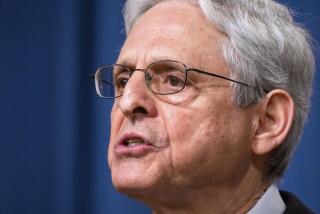Iran-Contra Probe Seen Gaining Steam as Key Answers Appear About to Emerge : Prosecution: The investigation is beginning to establish a cover-up by CIA officials. But a former top intelligence aide may not cooperate.
- Share via
WASHINGTON — Nearly five years after it began, and with criminal charges against its most visible figure now dismissed, the federal investigation of the Iran-Contra affair churns on like a juggernaut.
Key Senate Republicans contend the investigation should have been dropped long ago, and other critics question the relentless and expensive mining of an episode that so clearly is fading in the public mind.
Yet the probe--pressed on by independent counsel Lawrence E. Walsh, a 79-year-old former federal judge, Wall Street lawyer and high Justice Department official--now seems to be finally hitting its stride, finding answers to questions that had eluded all the earlier inquiries.
Most notably, it has begun to establish a cover-up by ranking CIA officials that blocked Congress from fully unraveling the scandal arising from the Ronald Reagan Administration’s secret sale of arms to Iran and the diversion of profits to support Nicaragua’s Contras.
Even so, the latest and highest ranking former CIA official to be indicted in the case, Clair E. George, has pleaded not guilty and given no sign that he will cooperate with investigators.
George, who ran the agency’s clandestine operations, instead appears to be adopting a defense like that used by former White House aide Oliver L. North, the central figure in the scandal. Although he was found guilty by a jury of charges arising from the scandal, North’s conviction was later set aside, and all charges against him were dropped on Monday.
North’s defense strategy was based on seeking to introduce into evidence classified documents that the government will not allow to be made public, depicting the defendant as being caught in a power squeeze between the executive and legislative branches, and arguing that congressionally immunized testimony tainted the case.
With the five-year statute of limitations looming for any criminal prosecutions based on the alleged cover-up put into place after the Oct. 5, 1986, downing of a Contra resupply plane operating under North’s auspices, Walsh’s investigation clearly is running out of time.
But regardless of future convictions, pleas, acquittals and reversals, the investigation already has scored solid achievements that seemed to have been obscured by the dramatic dismissal of charges against North.
So far, nine participants in the Iran-Contra affair have either pleaded guilty or been convicted. Of those nine, only North’s conviction has been reversed and charges dropped. John M. Poindexter, national security adviser to former President Reagan, has appealed his conviction on five felony charges, citing the same legal argument that finally succeeded for North. Poindexter’s appeal has yet to be decided.
In addition to building a clear legal record of what actually took place in the worst scandal to envelop the Reagan Administration, the Iran-Contra criminal prosecutions are expected to serve as deterrents to future unlawful activity by public officials.
The effort is not without its critics, however. Senate Minority Leader Bob Dole (R-Kan.), for one, contends that “every conviction won by Mr. Walsh has been overturned--or is likely to be,” and said the investigation and related court cases have cost $50 million.
Walsh, citing figures from the administrative office of U.S. courts, said his expenditures actually have totaled only a little more than half of Dole’s estimate: some $27.4 million through July 31.
“I don’t have any regrets or apologies in that respect,” he said. “Anyone who committed a lawyer to organize an office and undertake this investigation must have realized it was going to be very costly.
“There’s no such thing as a cheap investigation of this magnitude,” Walsh said on the stairs of the federal courthouse here after charges were dropped against North. “The question was: Do you want the job done and pay for it, or do you want it half-done and not pay for it? Because I think a half-done job is a total waste of money.”
Walsh’s office employs seven full-time attorneys and a support staff of 31. At its peak in early 1987, as the lawyers and investigators worked to lock up testimony and other evidence before televised congressional hearings created immunity problems, the office had 28 attorneys.
Besides the specific criticism of Walsh’s handling of the Iran-Contra investigation, the very concept of allowing an independent counsel to prosecute ranking executive branch members continues to rankle the White House and the Justice Department.
Although the process has been repeatedly authorized by Congress and upheld by the Supreme Court, it draws criticism on grounds that it has the potential to create an unrestrained prosecutor not subject to the checks and balances imposed on regular prosecutors.
But some argue that Walsh is not really as independent as his office suggests. Ronald Noble, who as a Justice Department lawyer fought against Walsh’s attorneys over what classified information could be used in Iran-Contra trials, said that secrecy restrictions undermined Walsh’s independence.
Once Walsh sought to use classified information, the Justice Department and executive branch were able to reassert themselves in the process, Noble said in an interview. The attorney general was allowed to determine what evidence could or could not be introduced. When certain classified information was placed off limits in the case against former CIA station chief Joseph F. Fernandez, the charges against him were dismissed.
But Noble, now a professor of criminal law and evidence at New York University Law School, rejected criticism that the nearly five-year duration of Walsh’s probe is excessive.
“Every day there are cases (brought) that are three or four or five years old,” he said. “The public isn’t aware of how protracted the criminal justice process can be.”
More to Read
Get the L.A. Times Politics newsletter
Deeply reported insights into legislation, politics and policy from Sacramento, Washington and beyond. In your inbox twice per week.
You may occasionally receive promotional content from the Los Angeles Times.










